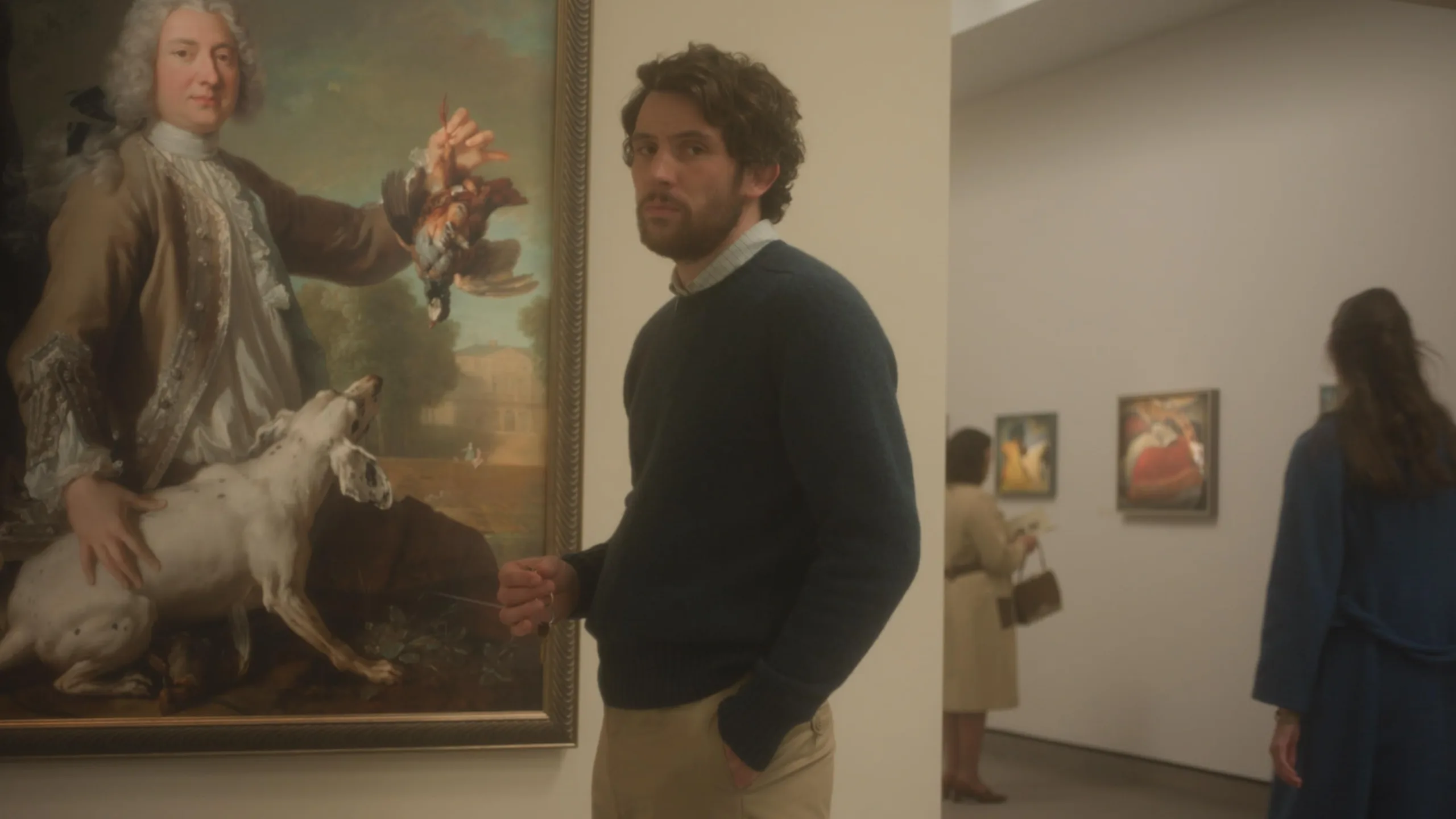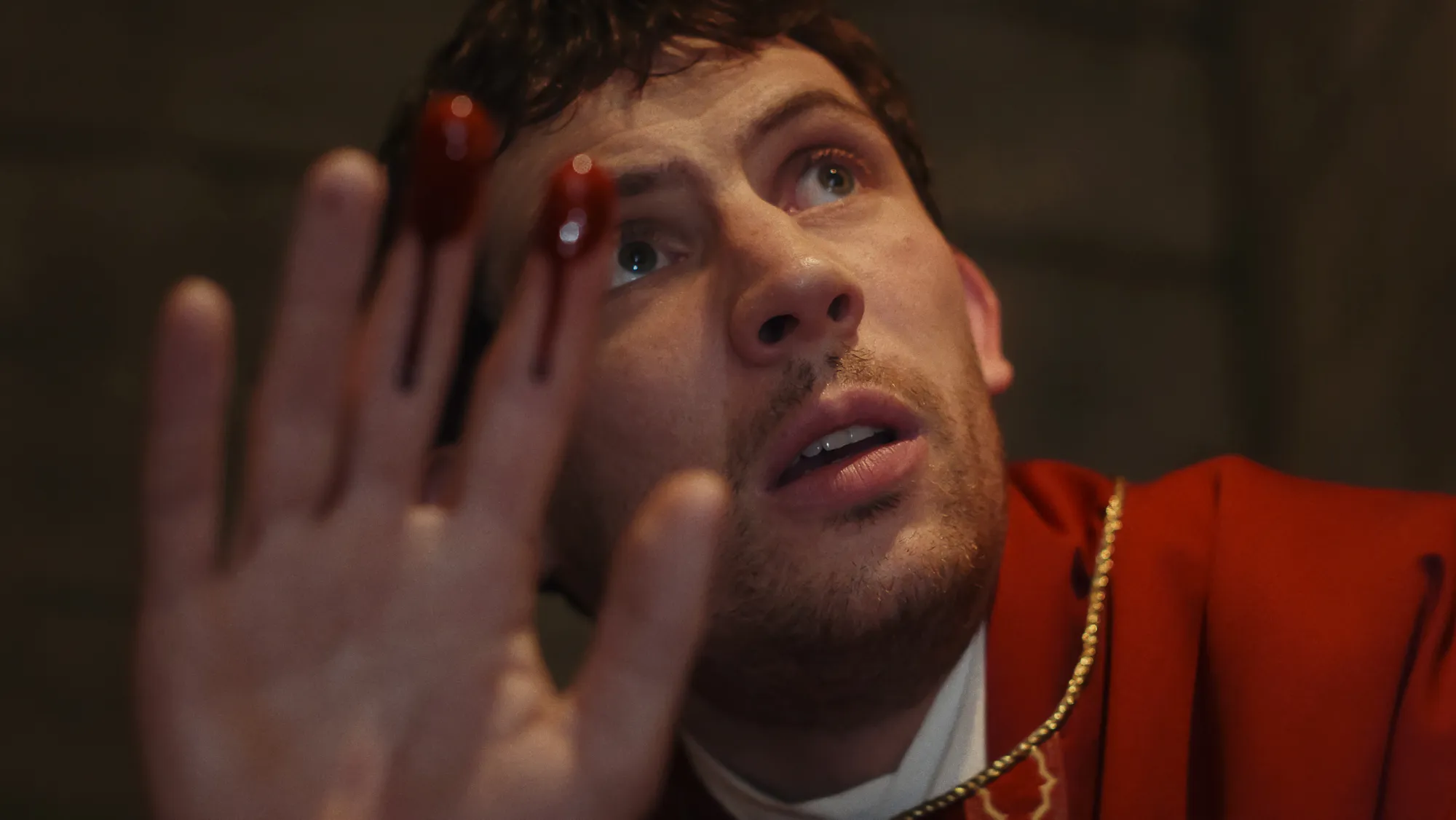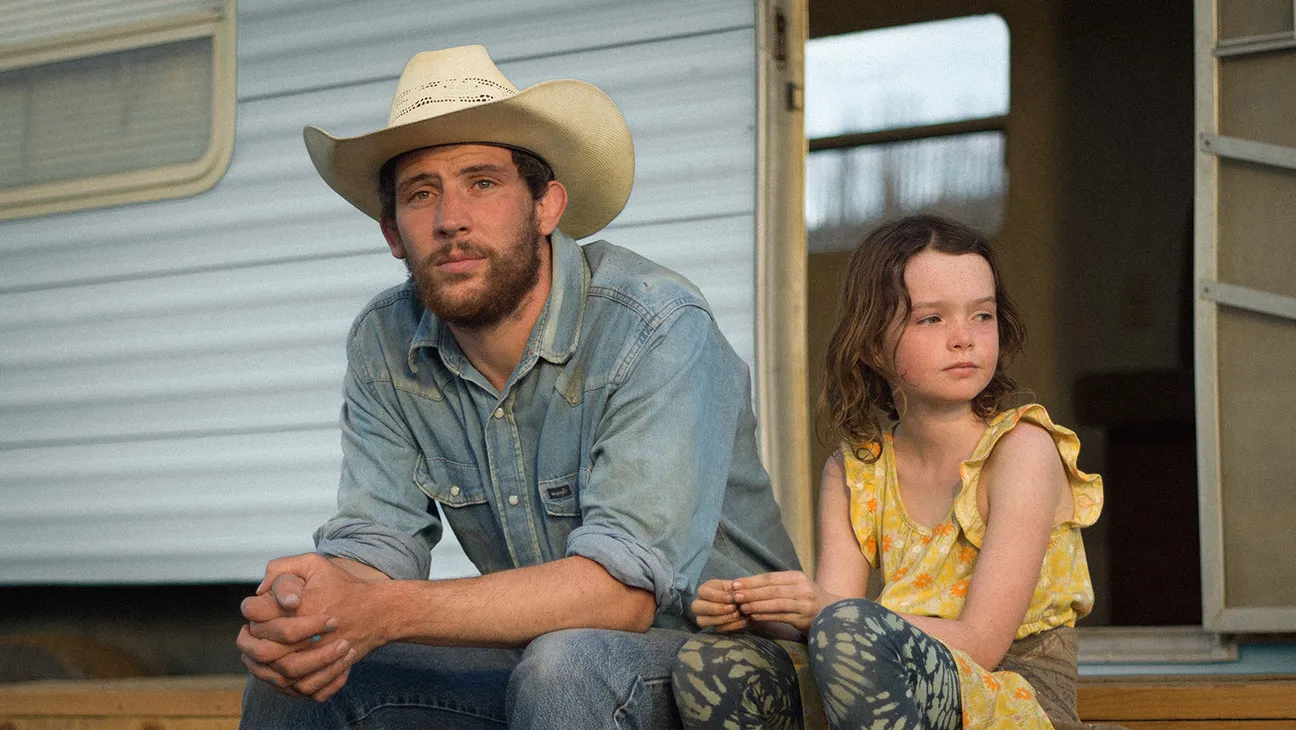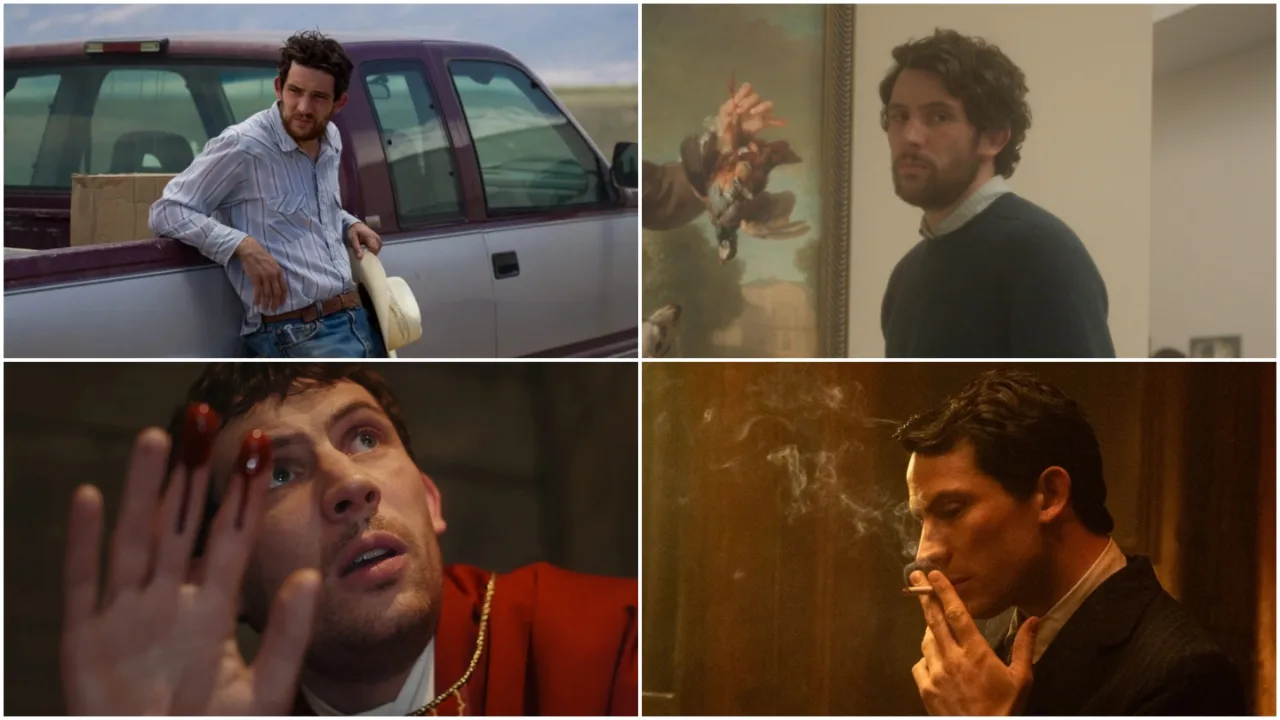It’s not uncommon for actors to have multiple projects come out in a given year; it’s rarer for three of them to be released within weeks of each other.
That’s the world that British actor Josh O’Connor is living in. He starred in four projects this year: as musician David White in Oliver Hermanus’ “The History of Sound,” as art thief James Blaine “JB” Mooney in Kelly Reichardt’s “The Mastermind,” as cowboy and rancher Dusty in Max Walker-Silverman’s “Rebuilding,” and as Reverend Jud Duplenticy in Rian Johnson’s “Wake Up Dead Man.”
What’s striking is that his characters are all echoes in some ways with his past roles and themes: O’Connor played another priest in Autumn de Wilde’s “Emma,” the theme of tortured and thorny love explored in “The History of Sound” appears throughout his work in “Mothering Sunday” and of course, “Challengers,” the existential questions O’Connor asks in “Wake Up Dead Man” correlate with his work in “Bridgend,” while “The Mastermind” and “La Chimera” seem to be kindred spirits as both revolve around the lengths people will go to steal and covet great art.
Amid a whirlwind of press for his projects, O’Connor had a far-reaching conversation with RogerEbert.com over Zoom about his four roles in 2025 and how they fit into his body of work as a whole. He spoke about how eating scenes act as a way to understand the internal wrestlings of a character (“Eating a sandwich is an opportunity to show you who a person is,” he shared), the gift of revisiting similar archetypes or themes but with different filmmakers, and where activism intersects with his artistry.
This conversation has been edited and condensed for clarity.

I can’t imagine what it’s like to be doing press about several projects at once … I feel like I’d be getting my anecdotes mixed up or might accidentally call a character by the wrong name … all the while you’re filming“Jack of Spades.”
Josh O’Connor: (Laughs) Do you know what? I’ve had to discuss three films in one week … I haven’t mixed up any names or stories yet, but this interview might just be the one …
Well, it doesn’t help that across your four characters, David White from “The History of Sound,” Dusty from“Rebuilding,” James Blaine Mooney for “The Mastermind,” and Jud Duplenticy from “Wake Up Dead Man,” your character names either start with J or D.
JO: I hadn’t thought of that, but it’s very true … they’re not making it easy for me.
I recall the press conference for “The Mastermind” at Cannes, where you shared how “in cinema, we’re shown the most extreme versions of characters and that’s what we call drama,” and that you’ve found yourself drawn to “the ordinary” characters in contrast. Especially with “The Mastermind,” I found that Kelly spent a lot of time focusing on your character eating. I’m wondering how you think about eating scenes as an actor, as a way to sort of get at what you’re referring to, if you see them as a way to luxuriate in the normalcy of the people you’re playing.
JO: It’s interesting, actually, because I hadn’t thought about that in this movie, but it’s been true across other projects. I remember on “Challengers,” Luca Guadagnino used to have me eating all the time. It got to a point where on set he’d tell me, “And in this scene, Josh, you are eating,” and I would go, “No shit. What the hell? Why am I always eating?” You’re right, something is humanizing about seeing a character eat. We all need to eat, and witnessing that–or the inclusion of those scenes–brings the audience back to this idea that the character they’re following is just a normal person.
What Kelly did so well with “The Mastermind” is that Kelly makes these supposedly extraordinary moments almost mundane, and brings them down to earth in a way where what’s unfolding could be plausible and real. I wanted to lean into that with Mooney, that he’s someone you could know. He’s not a bad guy, and he’s not from some messed-up background; he might have an authoritative father, but he’s a suburban, middle-class white guy in the early 1970s … things weren’t too bad for him back then. I wanted to press into the mundanity of that.
Back to “Challengers,” it is fascinating to consider how Patrick’s way of eating a churro or banana speaks to the restlessness he carries in his bones, versus JB’s way of eating a sandwich with a sense of lethargy.
JO: There’s no dead space in any movie. Anything that is directed or scripted–and even what isn’t–is an opportunity to reveal a new layer about your character. Obviously, you have your lines and what you’re saying in the movie, but your physicality, what you’re doing in any given moment, gives so many clues … I think about how JB is rifling through the clothes to find money and the particular type of desperation I was channeling then. Eating a sandwich is an opportunity to show who a person is. As you said, in “Challengers,” it’s a different type of eating … in “La Chimera,” I don’t know if Arthur even ate at all!
All to say, you’re right to bring this up. I think any opportunity to give the audience a clue about a character’s thinking, feeling, or where they are is a good one, and one should take it.
Speaking of past roles, what’s interesting about all four of them is that they seem to be echoes of and in conversation with your larger filmography. I see your role as Jud, a character wrestling with the divine and the role of mystery, connecting with Arthur’s arc in “La Chimera.” I think of Dusty’s bucolic isolation in “Rebuilding” and how that might resonate with your character of Johnny in “God’s Own Country.” What excites you as an actor when you can revisit similar archetypes or themes but with different filmmakers?
JO: I think those are great connections. I don’t know if these films are consciously connected, but I think that there is a kind of echo in my life of wanting to tell the stories of all those characters you named. It’s funny how characters fall onto your lap at certain moments in your career and life that almost tell you things about yourself.
When the character of Arthur in “La Chimera” came along, I was in a state of grief. My grandmother had passed away earlier that year, and I was contending with that. My struggles affected how I played Arthur, particularly in how I embodied the soul-searching he was doing for a life beyond that world. Johnny Saxby, of course, had a big influence on my life, and when “Wake Up Dead Man” came along, I was excited because I love the “Knives Out” movies.

I remember being so thrilled about playing Jud Duplenticy and the conundrum he’s in because I’ve felt similar about my faith and religion, particularly around the difficulties about how one can greatly misinterpret God and how far people can take those interpretations. In Jud and Josh Brolin’s character, Msgr. Jefferson Wicks, you find two people who believe in the same God, and yet they’re polar opposites in their moral position. You’re right to bring these roles up because I think each one has met me in a moment when I’m asking certain questions and searching for answers in my own life.
I love the anecdote you were telling Jessie Buckley about how you were booted from your altar boy job because you were smiling too much, and now, you’re playing someone like Jud.
JO: (Laughs) That’s my revenge against the Catholic church. You can’t keep me off the altar!
Regarding “The Mastermind,” JB tries so hard to live his own life, but he can’t help but get swept up in these larger geopolitical conversations … especially towards the end of the film. I’m curious how this idea resonates for you as an actor–whether you take on roles that are explicitly political or not–how you’re grappling with going about the everyday in your vocation, while these seismic shifts are happening around you?
JO: I’m a great believer that some people are just born activists and some aren’t. I don’t think I have the natural activist gene; my siblings and parents do. But I do feel very politically conscious and socially conscious. Ultimately, I look around the world right now, and I’ve really grappled with the injustice from class divides and racial wars. I think everyone is aware of these problems, but what’s interesting about Mooney is that he’s really knuckling down and putting his head in the sand where he doesn’t want to see any of that stuff. He’s too focused on himself.
Personally, I’m not like that. I look around and I think, “What are we doing?” I’m very openly a big old lefty socialist. However, there’s this notion that because actors are in the public eye, there’s this notion that people need to hear what we think. I’ve been doing these interviews and going on these huge political rants, but that’s just me. I’m not qualified to say my opinion as much as any other citizen of the world. I’m just an actor.
Even still, I think about how you openly signed a pledge in support of Film Workers for Palestine. You’re part of a growing company of artists that is choosing to steward their platform in that way.
JO: Certain things are to me very straightforward. It’s not just about what’s happening in Palestine, but when you look at the wealth inequality in the UK, you see that the cost of living is a disaster. We’re so quick to blame the EU and immigrants when, really, it doesn’t take much of a stretch to look around and say that we’ve got the biggest number of billionaires in recorded history. Elon Musk is close to becoming the first-ever trillionaire. Are we not going to take the time to look at them? When things are so plain to me, I’m going to speak up if someone asks me.

Max Walker-Silverman’s “Rebuilding” speaks to the unique camaraderie that forms between people in crisis. It made me think of the temporality of a film set, where you probably won’t ever work with that same permutation of cast and crew. When you look back at your four films from this year, what’s unique about those experiences, and what are you bringing with you as you move forward?
JO: It’s one of the things I’ve struggled most with. I have my coping mechanisms and I’m learning ways to soften the blow, but it’s still a big blow when you finish a project–particularly one where it’s a close-knit group–and you have to go your separate ways. “Rebuilding” is a perfect example of that; I met some lifelong friends in that movie. We were all plunked in the middle of nowhere in the desert in Colorado.
A big one for me was the end of “La Chimera.” I lived with these people for about eight months; we cooked for each other, we lived in each other’s pockets. They’re my family. I felt like I became Arthur. There’s grief at the end of a job because you’re saying goodbye to a person that you’ve and who you’ve lived with for a long time.
But also, as you rightly say, it’s hard to create these intimate relationships and leave. More and more, I’m learning that the big answer to that is having a community back at home that you learn from and that you’re desperate to get back to when you’re away from home. Maintaining and feeding are things I would argue I haven’t done so well in the last few years … hence having four films out in the three months (laughs). I think in the future, that’s something I want to tend to, and it will help me say goodbye to the temporary community.
A friend described JB as “a man whose feelings are never quite accessible.” That stands in contrast with a role like Jud, where he wears his emotions quite loudly. It’s made me wonder how your characters would respond to each other should they meet.
JO: I would pray that JB would find himself in Jud’s congregation. He might learn something. Jud is all about acceptance, forgiveness, and altruism. I’m not saying he’s a perfect man; in fact, he’d probably be the first to say that he’s deeply flawed, but that’s the whole beauty of Jud, this acceptance that he’s flawed and others are flawed. I think Jud would welcome JB into his arms, hopefully help him move on, and remind him to appreciate the beauty around him. He’s married to one of the Haim sisters, for God’s sake. He doesn’t need to go out and rob the Arthur Doves. It’d be great if they had a crossover.
“The History of Sound” is now streaming on MUBI, with “The Mastermind” to stream on December 12th.“Rebuilding” opens wide on November 21st via Bleecker Street, while “Wake Up Dead Man” is in select theaters via Netflix on November 26th and will stream on that platform on December 12th.












